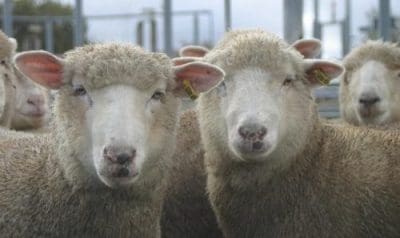 Currently, electronic identification is required across the beef supply chain but is yet to be broadly implemented in other sectors such as the sheep and goat industries.
Currently, electronic identification is required across the beef supply chain but is yet to be broadly implemented in other sectors such as the sheep and goat industries.
The council says the Federal and state governments must commit to implementing the traceability reforms agreed by industry and governments through SAFEMEAT.
Cattle Council of Australia President Lloyd Hick said the red meat industry is frustrated by the lack of progress by governments on these reforms.
“Electronic animal identification lets you track down any animal no matter where it moves in Australia,” Mr Hick said.
“This will be a critical tool if we need to get on top of a foot and mouth disease outbreak.
“Electronic identification will allow us to quickly trace all movements of livestock and track down any potentially infected animals.
“This would reduce infection rates, losses of livestock and food supply disruptions by speeding up eradication of the virus.
“This could save the Australian red meat sector and the economy tens of billions of dollars in the event of an outbreak.
“This technology is available now and has been in place in the beef for years, but we need it to be used in all red meat industries.
“The previous Federal Government committed $68.4 million to improved traceability across all of agriculture, and we must see the new government follow through on this.
“The State and Federal Governments must commit to getting the job done, to help protect our industry and food supply chain from serious diseases.
“The technology exists, and it works, it just needs to be put in place in all red meat industries.
“Producers can help improve traceability by adopting the electronic identification technology, ensuring National Vendor Declarations and waybills are filled out accurately and ensuring that all electronic tags are active and transferred on the database to their new property
“Everyone in the system needs to play their part.”
Source: CCA



Lloyd Hicks is right.
CCA should be lobbying the Federal Government to ensure ALL movements to new PICS are read.
QLD, in particular, does not require tag reading of cattle through transit yards. That is a total breakdown of the NLIS traceability system (which is legislated) and incurs fines for breaching.
NLIS is the world’s best electronic tracing system, funded by cattle producers to provide traceability in the event of an exotic disease outbreak.
If the system is not working, why are cattle producers spending an enormous amount of money tagging cattle???
Back to you, CCA.
Mr Hick is right. Traceability and biosecurity is an industry responsibility first and foremost. If there’s an inability to provide appropriate disease response then the industry has only themselves to blame, for not participating properly in NLIS and uploading their movement data on time.
Of course, the squeaky wheels in the industry will say it’s a government failure to enforce the regulations, and it’s not their fault the government didn’t make them do the right thing by themselves and their industry, and they’ll be partially right. But that’s like blaming cigarette companies for starting bushfires.
Governments will then say they didn’t want to run the risk of producers not uploading tag data at all after fines were issued for breaches of regulations, creating an ecosystem of fine evasion and clandestine movements, and fomenting genuine chaos for traceability efforts that will jeopardise Australia’s international trade…
Oh… wait… our gold standard traceability system theoretically already jeopardises Australia’s international trade, because the state and territory governments do not enforce their regulations, and some producers just bumble along being belligerent, daring the world to wake up.
Regulations MUST be enforced, for the benefit of the livestock sector, its supporters, the communities who depend on it, and the poor bloody taxpayers who will have to bail out an industry let down by a myopic minority.